Investment Real Estate Market Report | 3Q FY2024

Areas subject to collection of data
Tokyo Central submarket: Minato-ku, Chiyoda-ku, Chuo-ku, Shibuya-ku, Shinjuku-ku, and Bunkyo-ku
Tokyo South submarket: Shinagawa-ku, Meguro-ku, Setagaya-ku, and Ota-ku
Tokyo North / West submarket: Suginami-ku, Nakano-ku, Nerima-ku, Toshima-ku, Itabashi-ku, Kita-ku, and Taito-ku
Tokyo East submarket: Koto-ku, Sumida-ku, Arakawa-ku, Edogawa-ku, Katsushika-ku, and Adachi-ku
Yokohama / Kawasaki region: Yokohama city and Kawasaki city
Detailed descriptions
Pick Up Area: For investment real estate, trends in the average gross yields on contract price and initial asking price, together with the number of closed contracts by submarkets are represented in the graph. The details of the transition of actual market value and properties both for sale and sold in certain neighborhoods are also shown.
Market Overview: As an overview of all the submarkets, the trend from the past to this quarter is available. Trends in the average gross yields based on contract price and initial asking price together with the number of closed contracts by area are shown for comparison.
Data Source: Information is extracted from the database containing properties offered for sale and contracts concluded through Mitsui Fudosan Realty Network (En-bloc condominiums / office buildings / apartment buildings).
- Number of Transactions & Average Gross Yield on Contract Price: Number of contracts closed in a quarter (three months) and average gross yield of them (including estimated values)
- Average Gross Yield on Initial Asking Price: Quarterly average gross yield of closed contracts based on their asking price initially quoted
*Figures in each chart represent indices based on values for 1Q / FY2017 set at 100.
(Average Gross Yield on Contract Price is shown as an index to Average Gross Yield on Initial Asking Price for 1Q / FY 2017 set at 100.)
[Note] The historical data may be revised subsequently due to maintenance carried out from time to time, such as adding newly acquired data.
Pick Up Area -Tokyo Central submarket-
(*)Tokyo Central submarket: Minato-ku, Chiyoda-ku, Chuo-ku, Shibuya-ku, Shinjuku-ku, and Bunkyo-ku
◆Movements by Quarter: Average Gross Yield on Contract Price / Average Gross Yield on Initial Asking Price / Number of Transactions
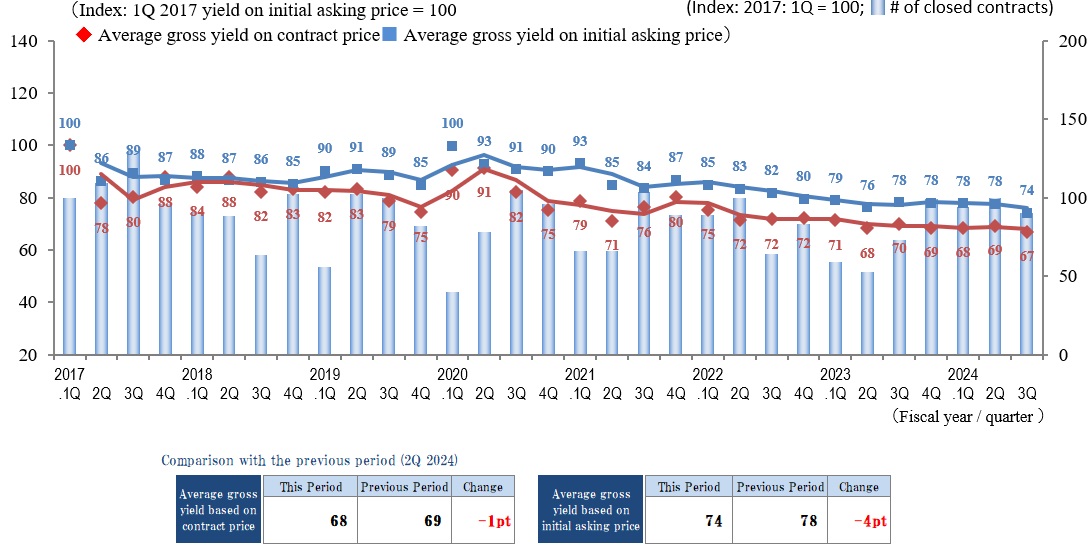
◆Brokered Transactions of Investment Real Estate in the Submarket
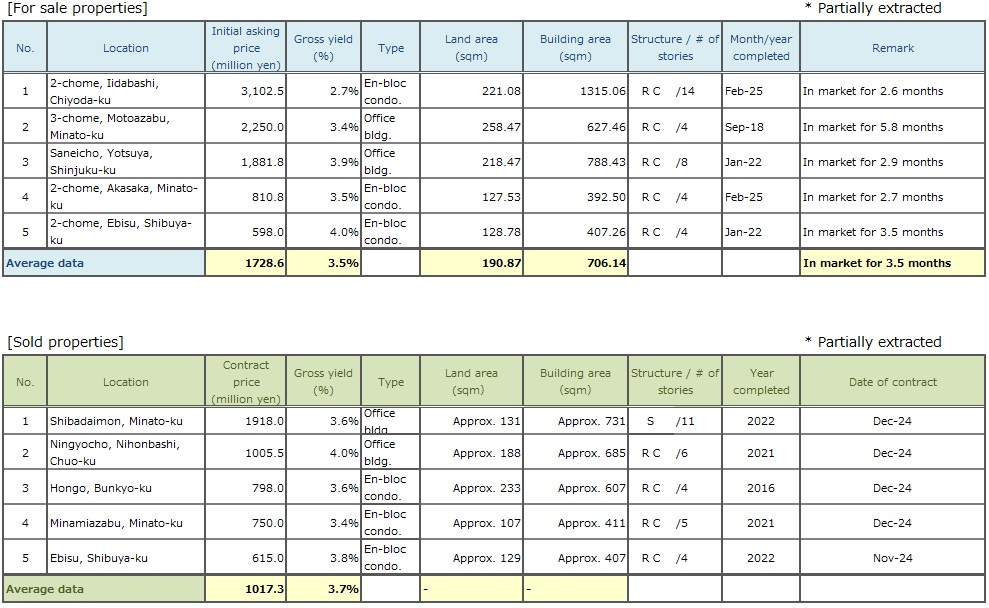
The Indices of the Average Gross Yield on the Initial Asking Price and on the Contract Price both fell QoQ (property prices rose) in the Tokyo Central submarket in 3Q / FY 2024. The number of contracts made showed an increasing trend YoY as market conditions remain steady. The leasing market in the Tokyo Central submarket shows the following trends:
■ Condominiums: The increasing trend in rents continued, centered on relatively newer properties and those with large floor areas.
■ Offices: Factors that include falling cancellation rates and leases concluded on expanded spaces have contributed to an apparent rebound toward falling vacancy rates and recovering rents.
■ Retail: Inbound demand continues to have a positive impact on business performance, and rents continue to increase and recover centered on street-level shops in well-known areas of the Tokyo Central submarket.
Because of the conditions described above as in the previous quarter, contracts are being concluded even at comparatively low yields for properties with potential rent upsides regardless of asset type. Regarding the future outlook for the investment real estate market in the Tokyo Central submarket, most observers see a strong likelihood of steady maintenance of current conditions or a moderate improving trend backed by favorable conditions in the leasing market, booming inbound demand, and restrained new supply as a result of high building material prices and the labor shortage. At the same time, potential future risks include the possible impacts of such factors as continued inflation as was experienced through the previous quarter, as well as rising interest rates and upward pressure on investment yields due to financial market volatility. Conditions will continue to require close observation.
Pick Up Area -Tokyo South submarket-
(*) Tokyo South submarket: Shinagawa-ku, Meguro-ku, Setagaya-ku, and Ota-ku
◆Movements by Quarter: Average Gross Yield on Contract Price / Average Gross Yield on Initial Asking Price / Number of Transactions
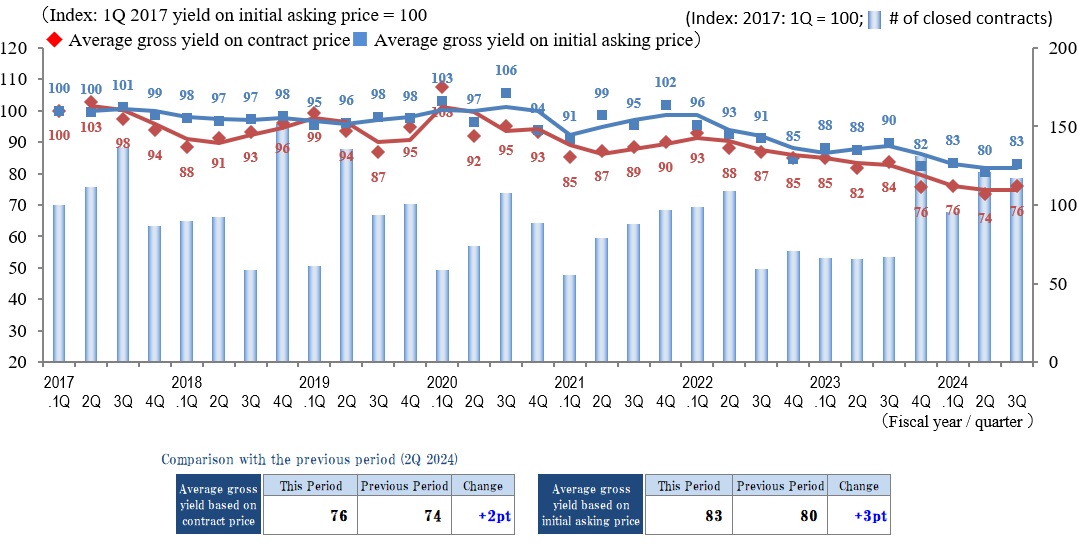
◆Brokered Transactions of Investment Real Estate in the Submarket
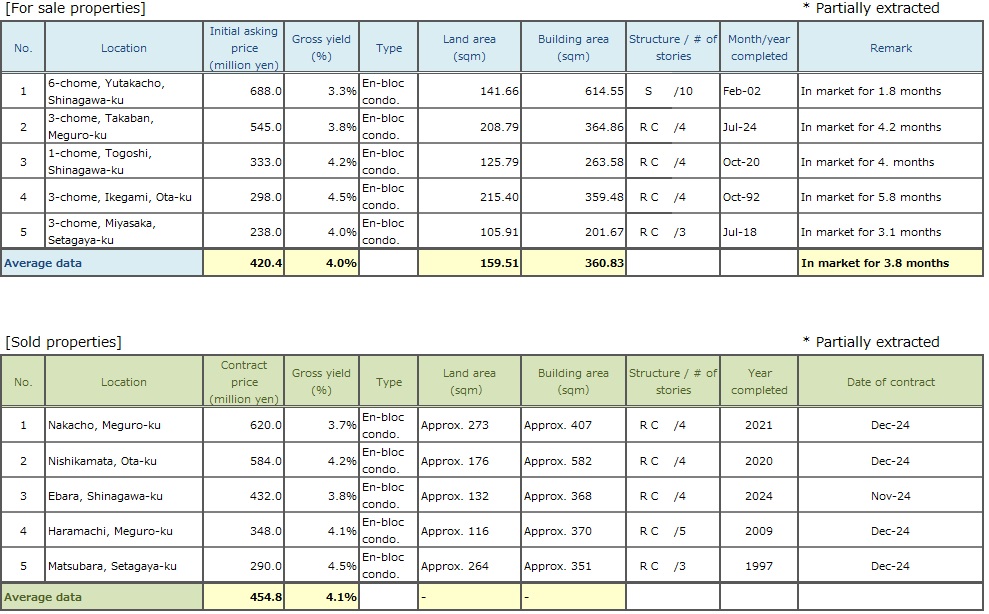
In the Tokyo South submarket in 3Q / FY 2024, the Index of the Average Gross Yield on the Initial Asking Price rose by 83 and the Index of the Average Gross Yield on the Contract Price by 76 as each indicator rebounded by two to three points from a record low in the previous quarter but still remains low. In consideration of the facts that the trend in the number of contracts made remains favorable and the gap in average gross yield between contract and sale remains small, transactions would appear to be stable in the Tokyo South submarket as the balance between selling and buying is sound, although at a high level.
A look at the outlook for real estate market conditions in the future shows the risks of restrained personal consumption due to inflation and of rising interest rates as the BoJ has increased its policy rate to 0.5%. High and rising construction costs also are becoming more pronounced because of the longer construction quarters as a result of the labor shortage and restraint on working hours from work-style reforms, in addition to high building materials prices. While quality used properties are attracting attention, buyers are extremely selective when choosing properties, and there is a possibility that polarization of real estate prices could proceed further. Global economic uncertainty is also strengthening further with the start of the second Trump administration.
Ascertaining market developments while monitoring trends in stock prices and exchange rates can be considered vital under these conditions.
Pick Up Area -Tokyo North / West submarket-
(*) Tokyo North / West submarket: Suginami-ku, Nakano-ku, Nerima-ku, Toshima-ku, Itabashi-ku, Kita-ku, and Taito-ku
◆Movements by Quarter: Average Gross Yield on Contract Price / Average Gross Yield on Initial Asking Price / Number of Transactions
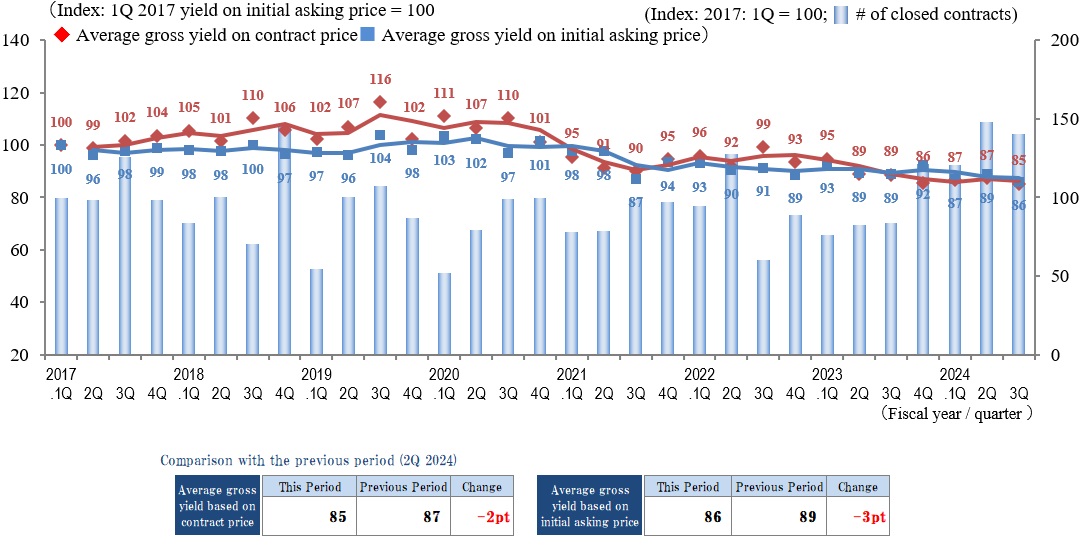
◆Brokered Transactions of Investment Real Estate in the Submarket
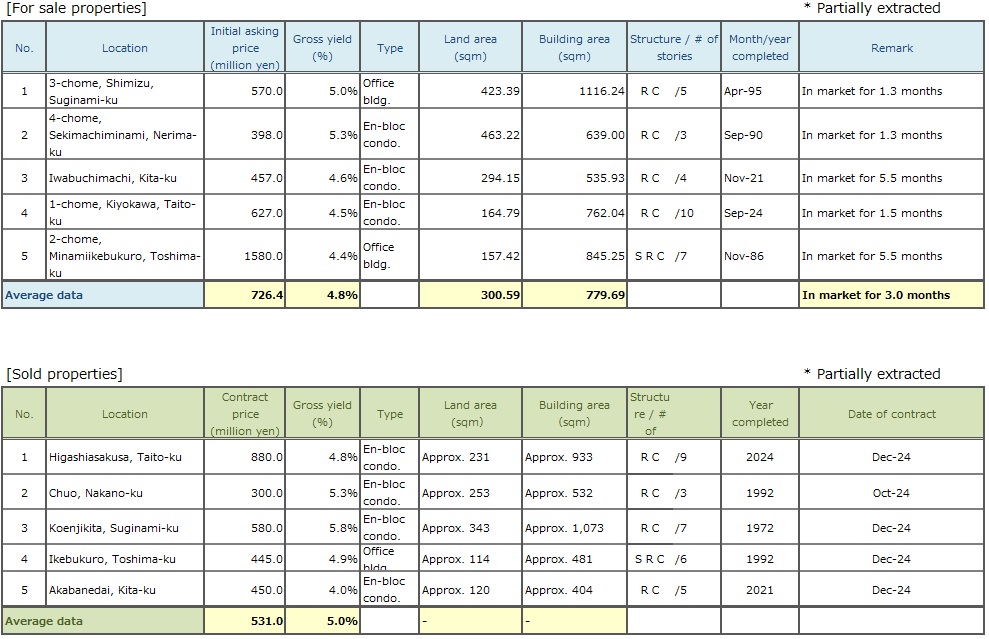
In the Tokyo North / West submarket in 3Q / FY 2024, both the Index of the Average Gross Yield on the Contract Price and the Index of the Average Gross Yield on the Initial Asking Price fell QoQ (property prices rose) with each reaching its lowest level since data collection began in 2017. While yields are decreasing for both contracted properties and properties for sale, centered on relatively newer properties and those near the Tokyo Central submarket, the number of contracts made remains at a high level, as was the case last quarter, and conditions of the real estate investment market in this submarket can be described as highly favorable.
This combined with booming inbound demand spurred by the low yen has driven favorable market conditions that have continued since FY 2024. While the future outlook may be considered optimistically, issues with regard to high building materials prices and an increasingly severe labor shortage are becoming more pronounced in the construction industry, and the resulting pressure of construction costs on revenues and expenditures of new development projects has led to some projects being revised. There also are concerns about the potential impact on the investment real estate market of increases in BoJ policy interest rates. It is important to consider exit strategies in advance while monitoring market trends to avoid having to catch up to price trends in the event of future changes in market conditions.
Pick Up Area -Tokyo East submarket-
(*) Tokyo East submarket: Koto-ku, Sumida-ku, Arakawa-ku, Edogawa-Ku, Katsushika-ku, and Adachi-ku
◆Movements by Quarter: Average Gross Yield on Contract Price / Average Gross Yield on Initial Asking Price / Number of Transactions
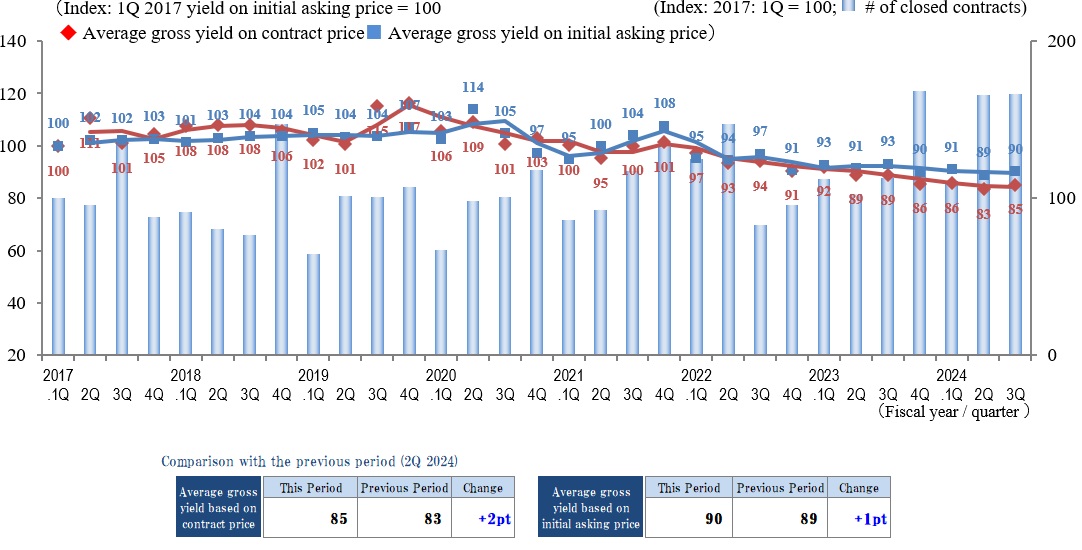
◆Brokered Transactions of Investment Real Estate in the Submarket
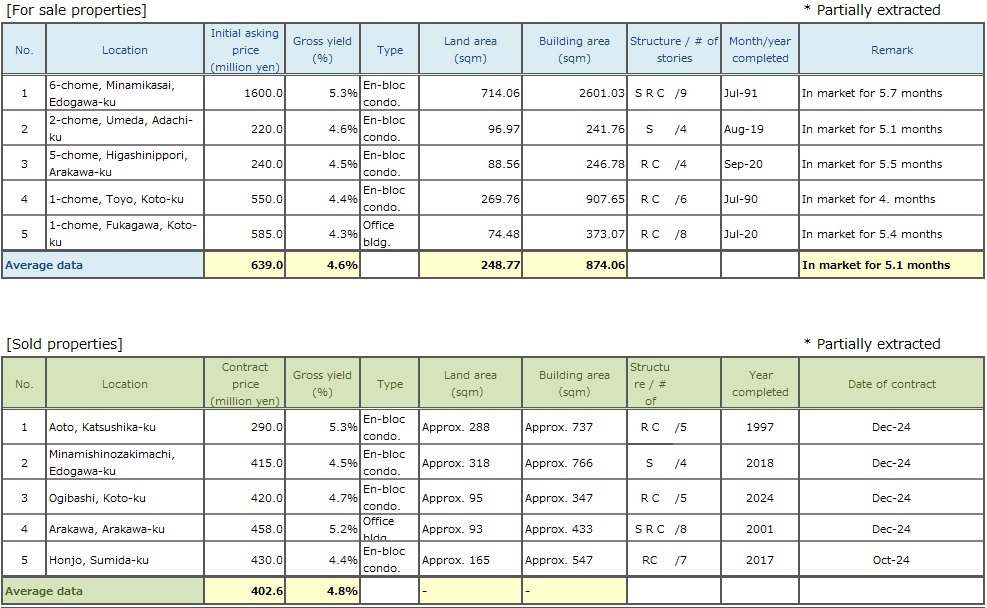
The Index of the Average Gross Yield on the Contract Price was 85, and the Index of the Average Gross Yield on the Initial Asking Price was 90 in the Tokyo East submarket in 3Q / FY 2024 as each index was up QoQ (prices fell), although generally remaining steady over the most recent year or so. The number of transactions also remains very high, as it was last quarter, as active trading appears to continue. While demand from buyers remains stable in this submarket, buying is concentrated on properties nearest to bustling railway stations nearer the Tokyo Central submarket and newer properties in good locations, such as those very close to stations.
Long-term stagnation is apparent for properties farther from train stations and older ones for which it is difficult to secure lending since the market shows a polarizing trend. In particular, among older properties that normally would be considered for rebuilding there are increasing cases of properties remaining unsold as a result of considering their potential as land purchases for rebuilding. While as noted above market conditions remain favorable and overall, there appear to be few cases of land prices having a major negative impact, and there are concerns about changes due to such factors as further increases in construction costs and rising interest rates on lending.
Pick Up Area -Yokohama / Kawasaki region-
(*) Yokohama and Kawasaki region: Yokohama city, Kawasaki city
◆Movements by Quarter: Average Gross Yield on Contract Price / Average Gross Yield on Initial Asking Price / Number of Transactions
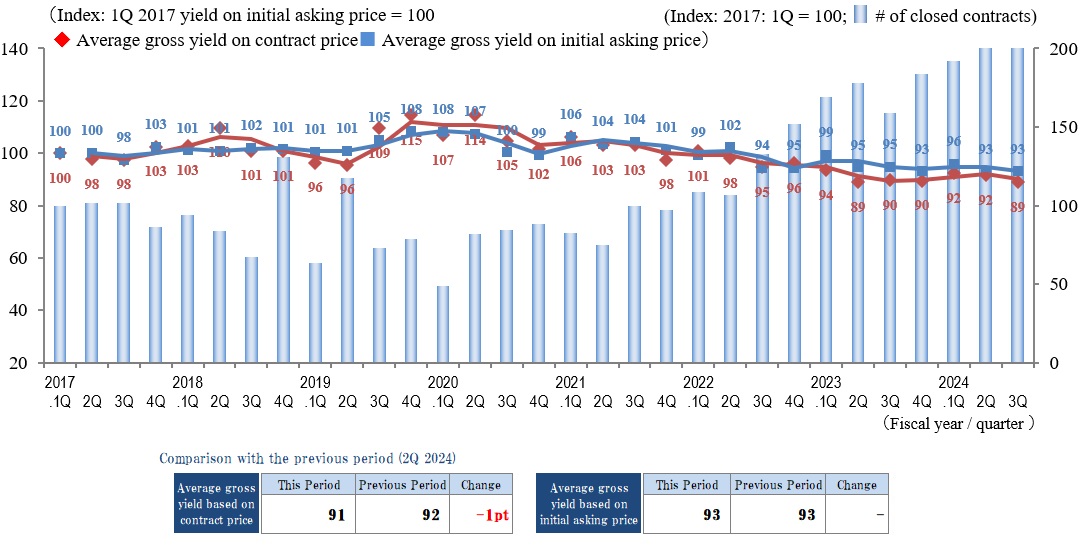
◆Brokered Transactions of Investment Real Estate in the Submarket
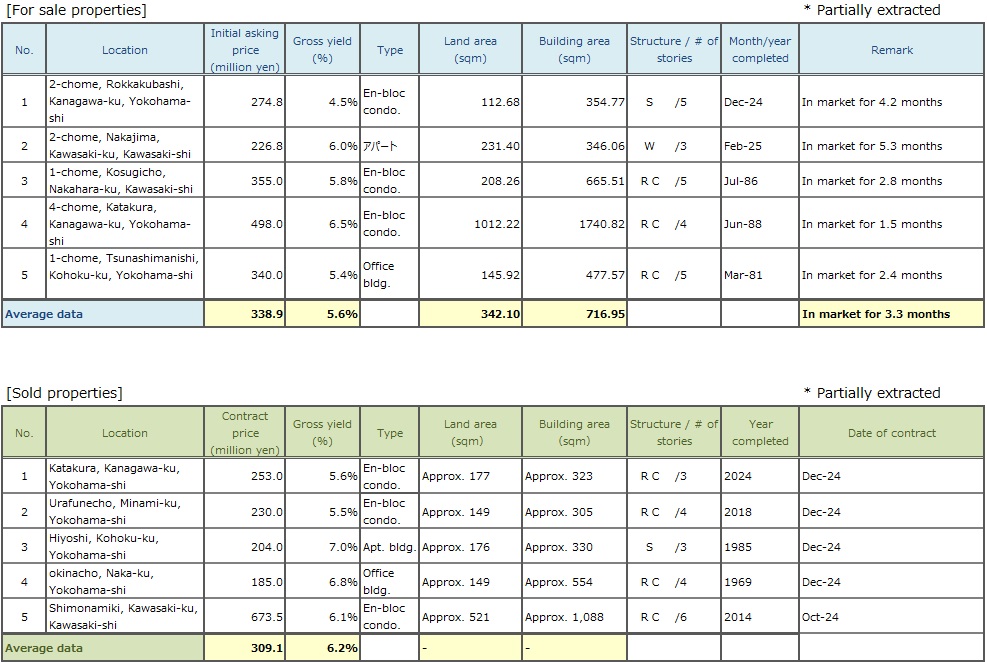
The number of contracts made in the Yokohama / Kawasaki region in 3Q / FY 2024 remained largely unchanged from the previous quarter. However, it was up sharply YoY to reach a record high level since data collection began in 2017 as it did in 2Q. Average yields for both contracts and sales remain largely unchanged QoQ, as the market can be said to remain quite active.
However, a look at individual transaction trends shows marked gaps in time until a contract is concluded and in contract yields (property prices) depending on property conditions, and a pronounced trend toward polarization between central and suburban areas. As the investment real estate market heats up, investors are expected to become more selective. There are no signs of an end to high building materials prices, and among transactions for development sites or for older properties intended for renovation, in increasing cases property prices are under pressure from construction costs. In the Yokohama / Kawasaki region, where land prices are relatively lower than in the Tokyo Central submarket, this is having a major impact, and as a result, there is an increasing likelihood or bearish price trends, particularly on small commercial sites what involve higher construction cost ratios.
Under today's conditions of positive interest rates, changing economic conditions lead increasingly to uncertainty, as seen for example in the impact on the market of changes in investor's buying appetite. Future conditions will need to be monitored carefully.
General overview
◆Movements by Quarter: Average Gross Yield on Contract Price / Average Gross Yield on Initial Asking Price / Number of Transactions for the 5 Areas
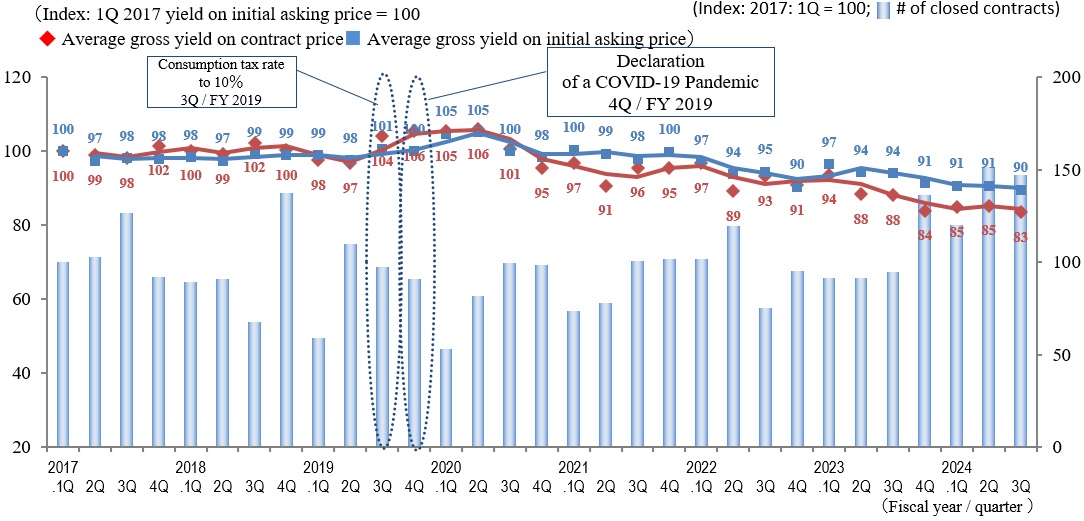
◆Movements in Number of Transactions by Area
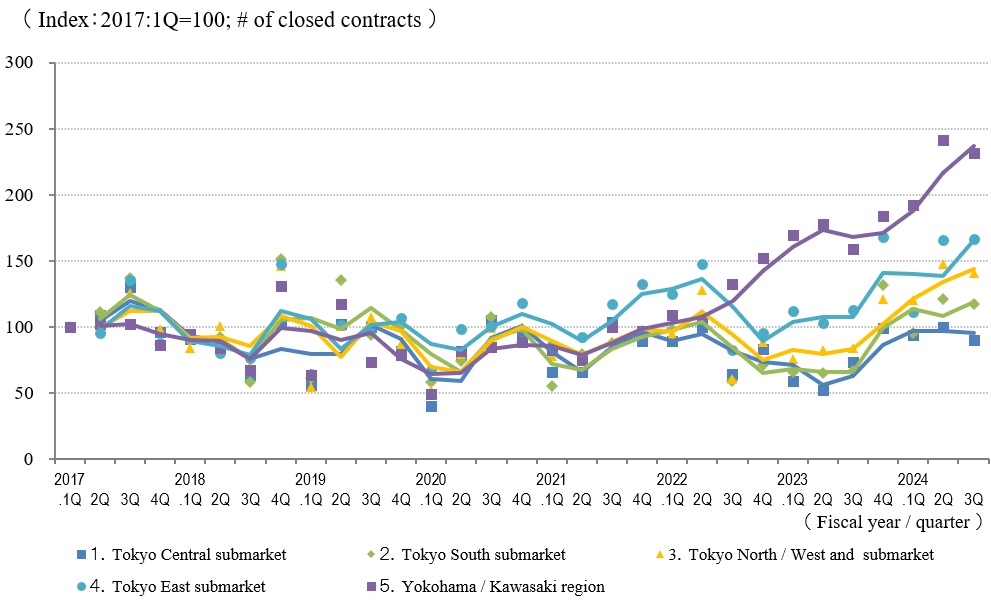
◆Movements in Average Gross Yield on Contract Price by Area
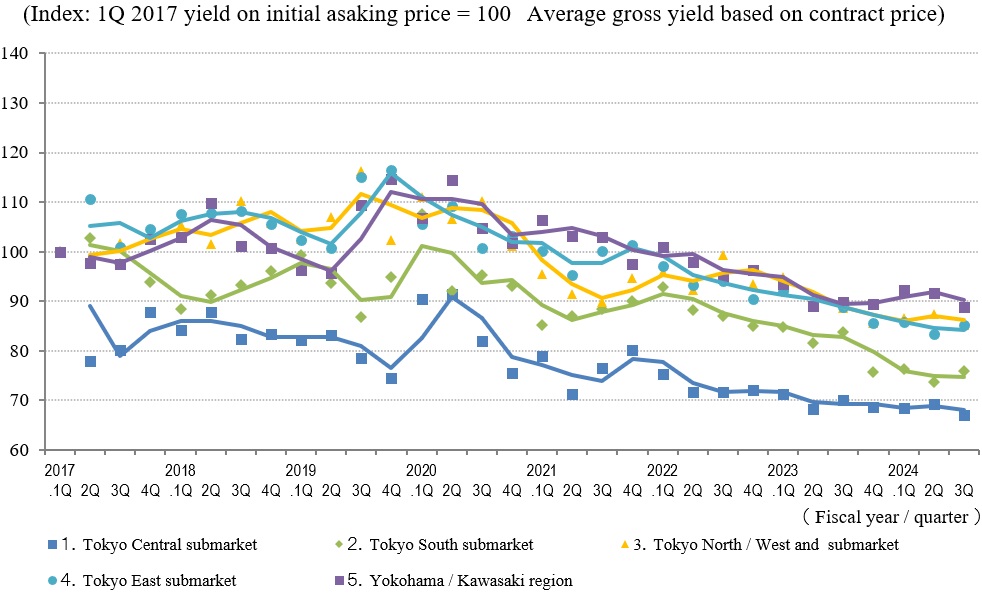
◆Movements in Average Gross Yield on Initial Asking Price by Area
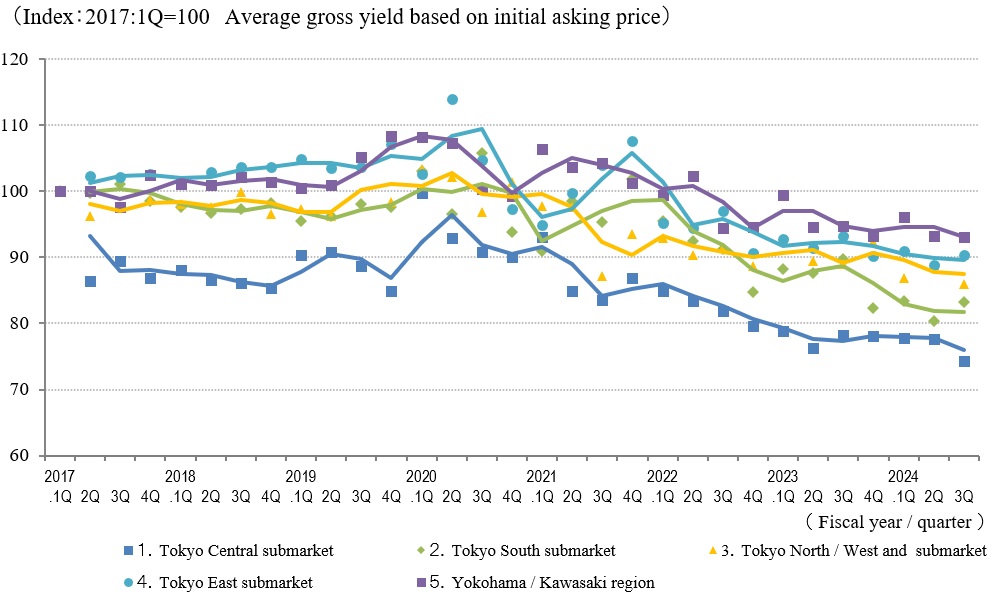
A look at the Index of the Average Gross Yield on the Contract Price on each region in 3Q / FY 2024 shows QoQ decreases of one to two points in each of the Tokyo Central submarket, the Tokyo North / West submarket, and the Yokohama / Kawasaki region, and increases of two points in the Tokyo South submarket and the Tokyo East submarket as the total index for the region as a whole fell by two points. The trend in the Index of the Average Gross Yield on the Initial Asking Price is largely identical to that in the Index of the Average Gross Yield on the Contract Price, as it fell by one point for the region as a whole.
Although the number of contracts made is down QoQ, it still is at is second highest number since data collection began as marked conditions remain strong. Despite overall continuing strong market conditions as noted in the comments on each region above, there are numerous concerns that could impact the investment real estate market in the future, such as rising construction and other costs and domestic and international interest-rate trends. As such, the market demands continued close observation from various perspectives.
お問い合わせ Contact us
まずは、お気軽にご相談ください。






